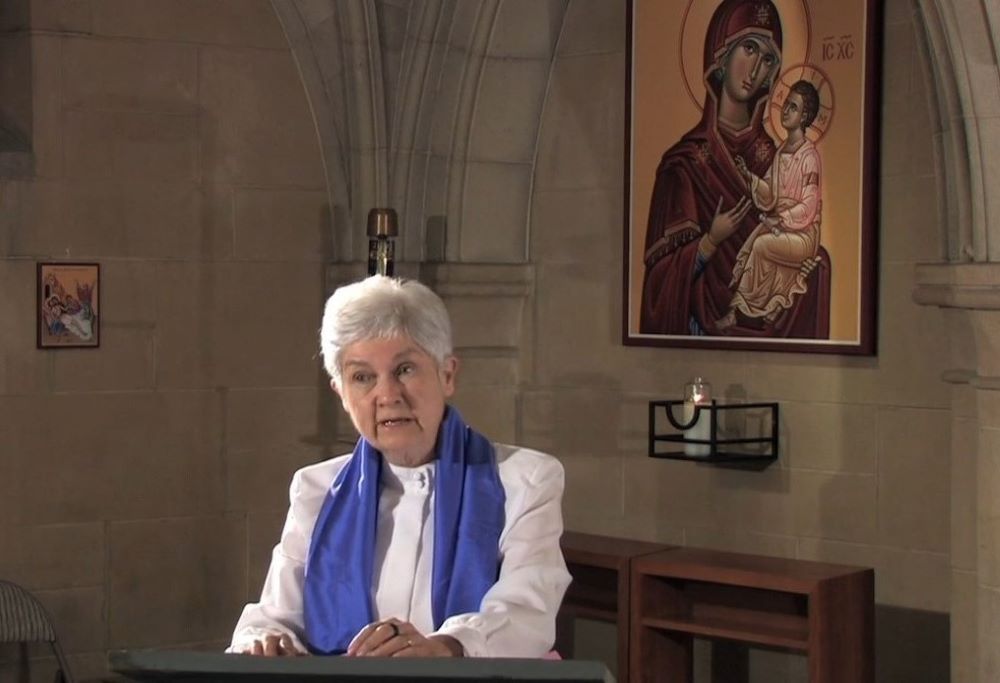
Dana Greene speaks about the fourth Sunday of Advent in 2011 at the Copley Crypt Chapel at Georgetown University as part of the "Women Proclaiming Advent" series that the women's advisory group at Woodstock Theological Center organized. Greene died Dec. 29 at age 80. (NCR screenshot/Vimeo/Woodstock Theological Center)
Dana Greene came to my defense.
Literally, and figuratively.
Dana arrived outside my dissertation defense room bearing a bouquet of flowers. She waited for what she considered a reasonable amount of time before opening the door, smiling graciously and offering congratulatory remarks, interrupting and ending my grilling a tad before my male examiners had intended.
From the time I met her until our last contact, Dana came to my defense by accompanying, encouraging and championing me in multiple spheres of my life as she did for so many others.
I met Dana in 2010 at the inaugural lunch of a small group of Catholic women convened by our mutual friend Dolores Leckey — then a senior fellow at the Woodstock Theological Center — to serve as the women's advisory committee to the center. That evening we attended a celebration of Dolores' new book, Monika Hellwig: The People’s Theologian, in which Dana had inscribed this description of Hellwig:
Sophisticated yet humble, learned yet generous and accessible, Monika Hellwig was driven by a bedrock faith to serve God and her fellows. She found her vocation at the intersection of her own unique capabilities and the world’s great needs. She was as Ireneaus allowed: a human fully alive and hence the glory of God.
The very same can be said about Dana.
Dana was an academic, a writer, a spiritual counselor, a wife, a mother, a reformer, a mentor and a friend who with every fiber of her being believed that our lives matter; she had a special calling to show how certain women's lives particularly matter. When she passed away on Dec. 29 at age 80, in the arms of her husband Richard and surrounded by family, a singular spirit was lost — and a life well-lived became a hallowed memory.
Dana Greene knew that through reading and writing the lives of others, our own lives can be illuminated.
In addition to her career as history professor and associate provost for faculty at St. Mary's College of Maryland and as dean and CEO of Oxford College of Emory University, her myriad contributions include the biographies she wrote about women whose lives of the spirit informed their creativity and their contributions. She studied and wrote about women's lives because she wanted to amplify their voices and understand their experiences. She recognized the beauty of these lives as colorful threads in a great tapestry; she knew that through reading and writing the lives of others, our own lives can be illuminated.
As her beautifully crafted obituary described, Dana invoked and animated the spirits of remarkable women in her nine published biographical works, including Lucretia Mott, Olympia Brown, Evelyn Underhill, Maisie Ward, Denise Levertov, Elizabeth Jennings and most recently, Jane Kenyon.
Dana's appreciation for biography as spiritual practice began at New Rochelle College, where she wrote her senior thesis on Dorothy Day, whose spirituality and activism were formative for Dana. I had a similar experience in a "Biography as History" course in college where I chose the Quaker minister Lucretia Mott as my subject. Little did I know then that the same Dana Greene whose collection on Lucretia Mott I quoted extensively would become a dear friend. Twenty-five years later, when Dana and I made the Lucretia Mott connection, I told her that her book Lucretia Mott: Her Complete Speeches and Sermons was not quite complete enough for me, so I had to travel to Haverford College where Mott's original speeches and sermons were archived — and where (conveniently!) my boyfriend, Peter, went to school. Dana laughed; she loved that Lucretia Mott provided an excuse to visit Peter. This was so very Dana: Relationships matter, and they can and should be kindled and nurtured alongside satisfying and important scholarly work.
Dana kindled and nurtured many relationships in the concentric circles of her life. She was attentive and dedicated to her inner circle of family. Richard Roesel was her husband of 55 years and her companion in every way. She was a guide to their daughters Kristin, Justin, Lauren and Ryan, whose lives and careers were inspired by her example.
She cultivated relationships in the wider circles of Catholic spiritual, intellectual and political life, where her presence will be missed and her work will have lasting impact.
I don't know how she did it, but she had a generous capacity for giving of herself, while never appearing to me pressed or rushed for time. Actually, I do know how she did it. She was consistent and disciplined. For several years, she and I met once a week at the Firehook in Old Town Alexandria for breakfast. She had trained as a spiritual director at the Shalem Institute for Spiritual Formation, where she served on the board for many years. Though she was no longer providing formal spiritual direction, she provided me with spiritual counsel and wise advice.
She taught me what it meant to sit with discomfort; she encouraged me to look squarely at the facts of my life, to let myself grieve failures and losses, while still believing in me and lifting me up. At every juncture, she came to my defense, assuring me I could do things when I was not so sure. I still have a bouquet of encouraging notes, signed DG, sent to my house and to my inbox, always perfectly timed and crafted, with beautiful shards of poetry and wisdom. She had an intuitive sense. One email she wrote only; "sending blessings …" and I responded simply, " … receiving them."
One could count on the delight of encountering Dana wherever thoughtful and creative Catholics were gathered, at a Catholic Imagination conference at Fordham University, at a Catholic Mobilizing Network event at the Vatican embassy, at her own lovely home overlooking the Potomac River hosting a National Catholic Reporter gathering. She wanted the Catholic Church to have a future, and believed its future must include women in leadership. She was part of the inspiration for a 2011 "Women Proclaiming Advent" series that our women's advisory group at Woodstock dreamed up and recorded. Four of us on our committee preached at the Copley Crypt Chapel at Georgetown University for the four Sundays of Advent, planting the seeds for the Catholic Women Preach project that Elizabeth Ann Donnelly — one of our preachers and committee members — later spearheaded with FutureChurch.
Advertisement
Dana's sermon for the fourth Sunday of Advent in that original collection is brilliant. She preached on the Annunciation and on Mary's witness and how narrowly Mary has been viewed:
"The problem with witnesses is that like all the saints they are shrouded in layers of hagiography, delivered through centuries by the arts, and confirmed in the hundreds of sermons we've heard over a lifetime," she said. "Nowhere is the problem more pronounced than with Mary."
Dana drew inspiration from Denise Levertov's poem "Annunciation," which focuses on the moments between the angel's announcement and Mary's response. During this pregnant pause, Mary is listening, attentive, pondering. Dana insists: "The quality here is not docility or passivity, but openness and intimacy."
Dana flips the narrative about these moments of which no one speaks, when God was waiting and " … honoring the freedom of one who could refuse or accept this invitation. This is not the story of God's power, but of God's humility; this is not celebration of a human cipher but of human freedom, of a Mary, beloved of God, living in the fullness of her humanity."
Dana demonstrates through her telling that Mary's life, Mary's agency, Mary's courage, Mary's potency — all of it matters. And this gave Dana hope.
When you met Dana, you saw a petite and beautiful and gracious woman. She was lovely, kind, intelligent and wise. She was also not docile and she was not passive. She had agency, courage, potency. Her life mattered. Her life matters. And this gives me hope.








